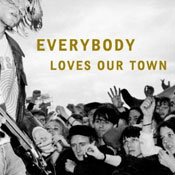"Grunge" is a term that reminds some folks of youth and the first tastes of music considered "alternative." Maybe flannel comes to mind, that infamous Mudhoney EP cover or the first time you ever saw Chris Cornell. It takes me back to being a kid watching Kurt Cobain sing "Heart-Shaped Box" on MTV.
Maybe the term gives you the shivers and raises decade-old rebuttals of "Alice in Chains were not grunge" or "Nobody who liked that music at the time uses that term," sparking eye rolls from music nerds all over the world.
"Grunge was an adjective; it was never meant to be a noun. If I was using it, it was never meant to coin a movement; it was just to describe raw rock 'n' roll. Then, that term got applied to major-label bands putting out slick-sounding records. It's an ill fit," says Mark Arm, singer for Mudhoney, in Mark Yarm's "Everybody Loves Our Town: An Oral History of Grunge" (Crown Archetype, 2011, $25).
Whatever level of musical wisdom you had at the time, "Everybody Loves Our Town" will satisfy all levels of curiosity whether you're a die-hard music geek or someone just looking to reminisce about a less-talked-about music era. With almost painful honesty, the interviewees spin candid and sometimes stomach-turning (I actually gagged two times) accounts of life on tour, emergency rooms, making albums and keeping band members out of jail.
Being a baby in the '80s, I was only familiar with the super-groups of that time: Nirvana, Soundgarden, Alice in Chains, Mudhoney and a few more. After reading this book, I sure as hell know that I essentially knew nothing about the scene before.
"Everybody Loves Our Town" is a comprehensive "textbook" about the scene from mid-'80s Seattle, Wash., to the worldwide popularity of grunge music across the globe in the early '90s. The book is an amazing read. It will have you laughing out loud and then have you mourning the tragic loss of some of this scene's main contributors. With detailed interviews of everyone from the crew at the then-fledgling Sub Pop record label to girlfriends of band members, doormen to managers, to the actual musicians themselves, the book brings complex human characteristics to some of the most famous musicians ever.
If nothing else, anyone who has ever had anything to do with a music scene will relate to the stories of house parties, young love, police confrontations and trying to get a band noticed any way possible.
"When I first played with them, they weren't even called Nirvana," Dale Crover of the Melvins says in the book. "They were in between names. ... They wanted to have their stuff on tape so they could shop it around and find a drummer. They got a record deal instead."
"Everybody Loves Our Town" starts at the beginning of the emerging Seattle music scene, highlighting bands like the U-Men and Green River. Thus begins the long list of bands that spawned from those two, either by members actually moving to other bands or by the many groups they inspired.
Yarm also chronicles the Sub Pop label and its creators, with honest (and sometimes brutal) accounts of bounced paychecks and bands stranded in the middle of nowhere.
Because it's an oral history in print (the format is strictly quotes), readers may find the seemingly endless list of bands with interchangeable and rotating band members a bit daunting at the beginning. Luckily, Yarm tells us which band the interviewee played for (or which member they dated, for example).
From Green River to Malfunkshun, TAD, Mother Love Bone and Skin Yard, to the beginnings of Soundgarden, Nirvana, Melvins, Hole and so on, you will come away from the book with a deep knowledge of the scene and a detailed idea of who's who. The book will bring readers a little closer to some of the more mysterious music figures. It certainly gave me a more well rounded idea of musical icons such as Kurt Cobain, Andy Wood, Layne Staley and their mutual failed struggles with addiction.
Weighing in at more than 500 pages, this is not a book that most will fly through. Instead, think of it as a welcome addition to the coffee table collection—or the avid music fan's night stand.



Comments
Use the comment form below to begin a discussion about this content.
comments powered by Disqus